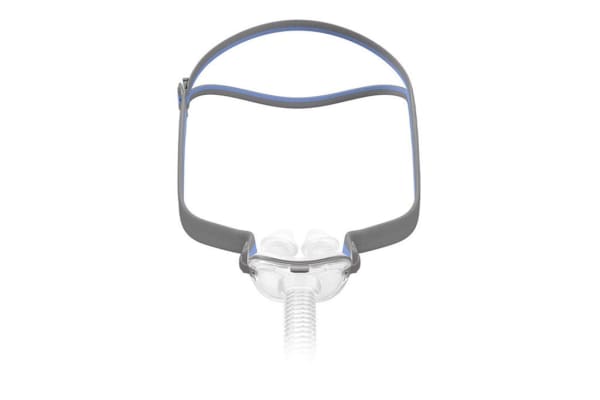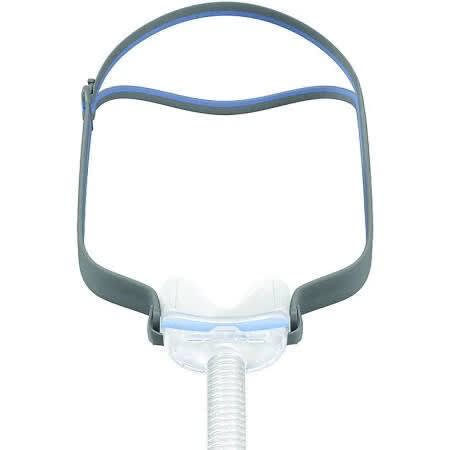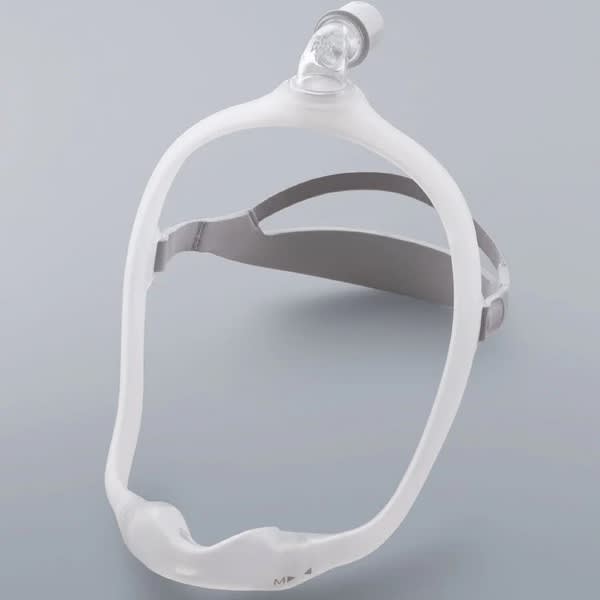Choosing the right mask to use with your continuous positive airway pressure (CPAP) machine is crucial for effective therapy, but it can be trickier if you have a beard. However, there are steps you can take to ensure a secure seal even if you have facial hair.
We’ll discuss our picks for the best CPAP masks for beards, then give tips on how to select a mask and how to get a good fit.
Sleep Doctor’s picks
Best Overall
ResMed AirFit P10 Nasal Pillow CPAP Mask
Details
-
Price: $99
-
Size: Small, medium, large, extra small for her, small for her, medium for her
Highlights
- Minimal contact points create a secure seal for people with beards
- QuietAir vent technology makes this a great choice for light sleepers
- Light and flexible headgear
Drawbacks
- May not work for people who breathe through their mouth
- Some people find the direct airflow of nasal pillow masks uncomfortable
Sleep Doctor’s take
The ResMed AirFit P10 Nasal Pillow CPAP Mask is one of lightest and quietest CPAP masks on the market. It’s also one of the best choices for people with beards thanks to its minimal facial footprint and light, flexible headgear. It comes with three nasal pillow sizes, and the simple design is easy to take apart and clean.
The ResMed AirFit P10 is a nasal pillow CPAP mask featuring a minimalist, lightweight design. This mask uses ResMed’s QuietAir vent technology that helps muffle the sound of exhaled air. The ResMed AirFit P10 comes with nasal pillows in small, medium, and large sizes so you can dial in your fit at home.
Why we like it
The minimal footprint of the ResMed AirFit P10 is ideal for people with a beard or any other style of facial hair. This mask sits under the nose, with nasal pillows that rest just inside the nostrils out of the way of facial hair.
Best for Side Sleepers
ResMed AirFit N30 Nasal CPAP Mask with Headgear
Details
-
Price: $99
-
Size: Small, medium, small wide
Highlights
- Low-profile design is ideal for side sleepers
- Adjustable headgear helps customize the fit
- Three size options: small, small-wide, and medium
Drawbacks
- People who breathe through their mouth may need a chin strap to prevent air leaks
- Front-facing hose connection may be uncomfortable for stomach sleepers
Sleep Doctor’s take
Side sleepers often struggle to find a mask that can stay in place, and a beard can further compromise the mask seal. However, the low-profile design of the ResMed AirFit N30 offers an elegant solution. This mask sits snugly under the nose and creates a strong seal that doesn’t interfere with facial hair.
The ResMed AirFit N30 Nasal CPAP Mask uses a narrow, low-contact nasal cradle design. The soft and flexible silicone cushion nestles under the nose and creates a strong yet comfortable seal that stays securely in place for side sleepers. This minimal design also works well for people with beards.
Why we like it
The slim design of the ResMed AirFit N30 Nasal CPAP Mask allows you to sleep comfortably on your side without worrying about how your beard might impact your CPAP therapy. The headgear is adjustable and you can choose between small, small-wide, and medium mask cushions to achieve a personalized fit.
Disclaimer: In November 2023, ResMed issued a safety notice cautioning that the magnetic clips on this model and other ResMed masks should be kept at least 6 inches away from any implanted medical device that may be affected by magnets, including pacemakers and insulin pumps. The company also warns that other metallic implants such as valves, stents, and certain dental implants may be impacted by the magnetic clips.
Best Lightweight
Philips Respironics DreamWear Under-the-Nose Nasal CPAP Mask
Details
-
Price: $93
-
Size: Small, Medium, Large
Highlights
- Lightweight design
- Head-mounted hose connection with 360-degree swivel
- Comes in small, medium, and large sizes
Drawbacks
- Not the best choice for people who breathe through their mouth
- Some people may not like the feel of the silicone frame
Sleep Doctor’s take
The Philips Respironics DreamWear Under-the-Nose Nasal CPAP Mask features a lightweight silicone frame and a cushion that cradles the bottom of the nose and creates a good seal. A top-of-head hose connection with full swivel rotation makes this one of the least intrusive masks on the market.
This mask uses a silicone frame that’s light and flexible, with a nasal cradle that sits under the nose and seals around the nostrils. It also includes a unique swivel hose connection and a hollow frame design that allows air to travel through the frame to your mask.
Why we like it
The lightweight, low-profile design of the Philips Respironics DreamWear Under-the-Nose Nasal CPAP Mask is ideal for sleepers who have a beard or other facial hair. The design creates a clear line of sight, making the mask a good fit for people who like to read or watch TV before falling asleep.
How we make our picks
Recognizing the challenge of finding a well-fitting CPAP mask for people with beards, we researched dozens of masks, looking for models with the best features for beards while also prioritizing features, user reviews, and brand reputation. Our aim is to enable straightforward comparisons and guide you toward the CPAP mask that works for you.
Best CPAP mask types for beards
In general, the most effective CPAP mask types for beards are those that make the least amount of contact with the face. While nasal pillow masks feature the lowest profile of any CPAP mask style, nasal masks that seal around the nostrils also have minimal facial contact.
Nasal mask
Nasal CPAP masks are designed to seal around the nose, making them generally suitable for individuals with beards. The mask’s top usually crosses the bridge of the nose and the sides seal to the skin, although some models sit just beneath the nose.
People who tend to breathe through their mouth during sleep may want to consider pairing their nasal mask with a CPAP chin strap. This accessory helps keep the mouth closed, promoting nasal breathing and minimizing air leaks.
Who it’s best for:
- People who breathe through their nose
- Side and back sleepers
- Those who find full-face masks obtrusive
Drawbacks:
- Stomach sleepers may find the design too bulky
- May not work for people with congestion, allergies, or other nasal issues
Nasal pillow mask
Nasal pillow masks are the most compact CPAP mask option, featuring two soft inserts that seal just inside the nostrils. This minimalist mask style suits active sleepers and those with facial hair, including beards.
This mask type provides an open feel and is less likely to dislodge due to its minimal contact points. However, like nasal masks, nasal pillow masks work best for sleepers who breathe primarily through their nose.
Who it’s best for:
- Active sleepers
- People with thick beards
- CPAP users prone to feelings of claustrophobia
Drawbacks:
- Some people find the nasal inserts irritating
- May be uncomfortable at higher pressure settings
Can you wear a full-face CPAP mask with a beard?
Full-face CPAP masks are often recommended for people who breathe through their mouth during sleep. However, they create more facial contact than other styles, which can make it more challenging to get an effective seal if you have a beard.
Strategies for mitigating mask leaks with a full-face mask include trimming your beard or using a beard conditioner. While CPAP chin straps are typically intended for nasal mask users, wearing a chin strap with your full-face mask may help keep the mask secured against your beard.
How to choose a CPAP mask if you have a beard
Beards can disrupt proper sealing, so select a mask that caters to your facial structure and beard length. It’s also important to match your mask style to your favored sleep position. While price is likely to influence your choice, your comfort and individual needs should guide your final decision.
| Size & fit | A well-fitting mask prevents air leaks and pressure loss. Longer beards might require larger masks to accommodate their volume, making size selection even more essential. |
| Sleeping position | Sleep position influences mask comfort and beard contact. Back sleeping is compatible with any mask style. Side sleepers often find full-face masks too bulky and prefer lower-profile nasal masks or nasal pillow masks. Stomach sleepers generally require the minimalist designs of nasal pillow masks. |
| Cleaning and care | Regular cleaning and care of your CPAP mask is crucial for effective therapy, especially if you have a beard. Beard hair can introduce oils and debris, impacting mask hygiene. Look for models that are easy to disassemble for cleaning with soap and water. |
| Compatibility | Compatibility between your CPAP machine and mask is essential. The majority of CPAP masks and machines are universally compatible, but there are some exceptions. Double-check that the mask will work with your machine before making a purchase. |
Tips for properly sealing a CPAP mask when you have facial hair
While beards can make obtaining a proper mask seal more difficult, certain accessories may help considerably.
- Use a mask liner: Opt for a soft fabric mask liner that fits snugly between your beard and the mask cushion. This creates a barrier that can improve comfort for larger mask styles while potentially reducing air leaks caused by beard hair.
- Condition your beard: Softened and well-groomed facial hair creates a smoother surface, enhancing the mask’s seal and minimizing leaks.
Frequently asked questions
Nasal pillow masks have the smallest facial footprint, reducing the risk of facial hair interference and air leaks. Nasal masks also have a low-profile design, so most of the seal is above your beard. While full-face masks are necessary for some CPAP users, they create the most contact with your beard and can be more difficult to seal over a full beard.
Facial hair can compromise the seal of a mask by creating gaps that allow air to escape, potentially reducing the effectiveness of CPAP therapy. Choosing the right mask and accessories for your sleeping position, CPAP pressure setting, and amount of facial hair can help mitigate this issue.
A CPAP mask can seal with a beard, but you may need to be mindful of the style of mask you choose and how you maintain your beard. Choose a mask with minimal facial contact to reduce the amount of surface area in contact with your beard. Keeping your beard shorter and conditioned may also be helpful.
Ask the Sleep Doctor
Have questions about sleep? Submit them here! We use your questions to help us decide topics for articles, videos, and newsletters. We try to answer as many questions as possible. You can also send us an email. Please note, we cannot provide specific medical advice, and always recommend you contact your doctor for any medical matters.






